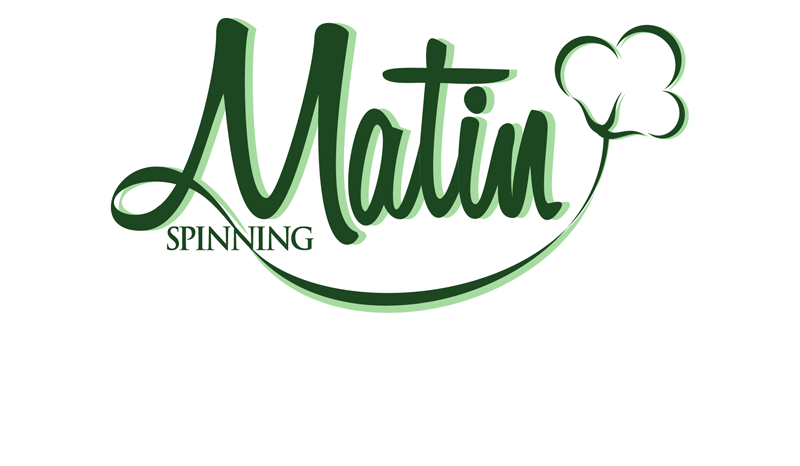Sustainability

People

Process

Product

Community

Environment
Our Pillars of Sustainability
Matin Spinning Mills PLC defines Sustainability as “the ability to survive and grow”. Matin Spinning Millls PLC Sustainability is based on five pillars: People, Process, Product, Community, and Environment; thus, integrating a holistic approach towards Sustainability. If any of these pillars are missing, the organization will not survive.
Different initiatives, whether they be with our various knowledge partners or of our own, are taken to address these five pillars. People development focus on empowerment, health, and hygiene. Process encompasses the machineries used in the production processes, interventions to improve efficiency, and even skill development. Products refer to innovations and the responsible use of materials in production. Community concentrates on the various development needs of the local community including education, health, hygiene, and even safety. Environment requires to be addressed to preserve the natural resources such as water, carbon emissions, etc. so that the future generations can avail them. Matin Spinning Millls PLC believes in voluntary doing to understand the needs and requirements and act accordingly to fulfill them.
Matin Spinning Millls PLC practices integrate the values “Learning is growing” and “Sharing is caring”. Through existing and future practices and programs, Matin Spinning Millls PLC wishes to learn and adopt globally recognized standards and encourage other to do the same.

People
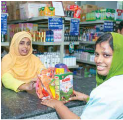
Bandhan fair price shop
The Bandhan Fair Price Shop serves people with all the essentials and commodities at factory price of the manufactures. It reduces workers’ monthly expenditure burden and shelters them from economic inflation. Goods are available at subsidized rates from 5% to 15%. “Bandhan” is the Bengali form of “Bonding”; it refers to the bonding between employer and employee. A total of BDT 7,754,042 sales took place in Bandhan in 2019-20.

Future Leaders Development Program (FLDP)
Under the FLDP, fresh graduates from reputed universities across the nation are recruited and trained and groomed to become the future leaders of our organization in a period of five years.
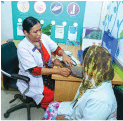
Women Health Program Initiative (WHPI)
The Women Health Program Initiative (WHPI) has a long-term objective to ensure good health and hygiene for all MSML’s female workers. The initial activity was providing women with sanitary napkins at discounted price of only Taka 10: thus, not only limiting to teaching women but providing opportunities for safe health as well. As a result, women workers now have improved health condition and there is reduced absenteeism.
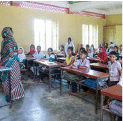
Supporting Employee's Children's Education
A set of programs exist in MSML which focuses on affordability and accessibility to education for all the employees of DBL. These include: Sponsoring two children of each staff and worker whose monthly income is below BDT 25,000, recognition for meritorious students, providing career path counselling to students who have passed Higher Secondary education.

Process
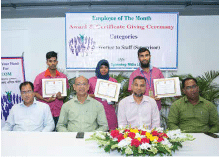
Idea Club
MSML encourages ideas from any employee or worker, regardless of their designation. Their efforts are recognized through a monthly recognition system: the “Employee of the Month”. In addition, the “Employee of the Year” has also been initiated. This promotes employees to work at their full potential and gives them a feeling of fairness as every employee has an equal opportunity at obtaining this reward. Ideas provided by workers helped in increasing productivity and reducing wastage
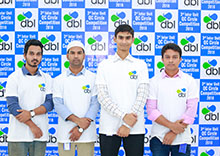
MSML Quality Control Circles
To promote employee engagement in workplace decision making, QC Circles have been set up in MSML. Currently MSML has seven QC Circles who periodically research different processes and activities and research on improving those using sophisticated methods of analysis. In-house QC Circle competitions are also taking place simulating the standards followed in the national level competition organized by the Bangladesh Standard for Total Quality Management (BSTQM).

Product
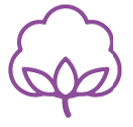
Organic Cotton
As an initiative to reduce the negative impact on the environment and consumers, Organic Cotton is imported from India to process organic yarn. Organic Cotton contributes to replenishing and maintaining soil fertility, building biologically diverse agriculture and using less water. Use of harmful pesticides, insecticides, etc. is also eliminated here which otherwise would affect farmers and wildlife. Currently about 35% of the total yarn production comprises of Organic Cotton.

Sustainable Yarn Production
As part of the 2020 Goal, our Spinning Mill now targets to have 20% of total production made from these recycled materials. Matin Spinning launched a series of innovated products in their production line such as yarns for loop and brush use, Cotton Neppy Mélange yarns, Snow yarns, etc. In raw material consumption, we are increasing sustainable and recycled fiber. The different innovations have allowed in reducing waste, reusing cotton and recycling to form new yarns.

Better Cotton Initiative (BCI)
The BCI has been undertaken by MSML to support the global standards for Better Cotton. BCI helps MSML in promoting its commitment to make global cotton production better for the producers, environment, and the sector. Over 60% of the total yarn production is from BCI cotton.

OEKO-TEX Standard 100
Integrating the Oeko-Tex Standard (Product Class I) enables MSML to follow the Restricted Substances List (RSL) specified by the certificate.
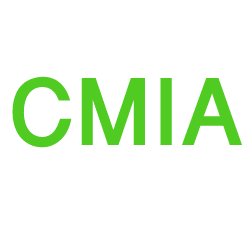
CMIA
Cotton made in Africa (CmiA) is an internationally recognised standard for sustainable cotton from Africa. Since 2005, CmiA has been committed to protecting the environment while improving working and living conditions for smallholder farmers and ginnery workers. Aid by Trade Foundation (AbTF) is a Hamburg-based foundation established by Prof. Dr. Michael Otto. It administers the Cotton made in Africa standard with the goal of protecting valuable resources, improving living conditions, and ensuring the viability of future generations through sustainable action.

Community

Community Education and Development Program
As a part of endorsing need for quality education in Bangladesh, MSML has undertaken multiple activities to promote education in the local community of Kashimpur. MSML created a four storied building in Hatimara School and College which accommodates 1,000 pupils. Furthermore, in 2015, 100 benches donated to Sardagonj Govt. Primary School as part of their request for facilitating them for the board examinations. A renovation work has also been done in the school to accommodate further students.
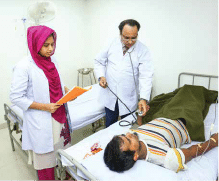
Medical Services for Workers and Their Families
An in-house medical facility in MSML is open to workers and their families. Apart from accidents or other emergencies, outdoor medical services are also provided. Health and nutrition tips are provided with special attention to children, nursing mothers, and pregnant women. Medicines in the in-house pharmacy are charged at manufacturers’ price. Furthermore, financial and logistical supports offered to employees on need basis.
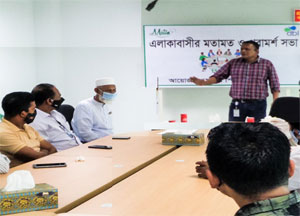
Community Knowledge Exchange Programs
With the motto of “Sharing is Caring”, MSML hosts Community Knowledge Exchange Programs to share learnings from the different Sustainability programs with the local community. The programs focus on:
- - Empowering women through financial literacy
- - Personal hygiene for women
- - Sexual and Reproductive Health Rights (SRHR)
- - Maternity protection and breastfeeding
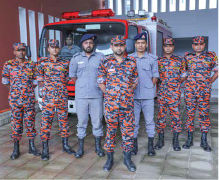
Mini Fire Station (MFS)
The Mini Fire Station is a public-private partnership between DBL Group, the German Cooperation through GIZ and the Bangladesh Fire Service and Civil Defence (BFSCD). The foundation stone was laid on 7 October 2015 by H.E. Dr. Gerd Müller, Honorable Federal Minister for Economic Cooperation and Development, Germany, and H.E. Mr. Tofail Ahmed, Honorable Minister of Commerce, Government of Bangladesh. The objective of the Mini Fire Station rapid response and risk reduction unit is to prevent fire in the industrial buildings around Kashimpur, Gazipur area. The facility is staffed 24 hours a day with a target to respond within the first critical 10-15 minutes to both industrial fire and building collapse. The MFS has already completed more than 100 successful operations in Kashimpur since it went into operation.

Environment
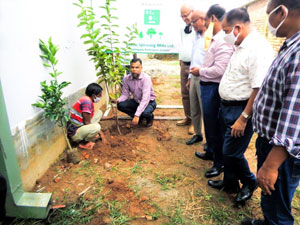
Trees to be Planted to Offset Carbon Emissions
Creating industries has a direct relation with creating employment. At the same time, carbon emissions are associated with the industries. A method of offsetting these emissions is by planting trees. Trees, of course, have other benefits including restoring biodiversity. Recognizing all these, DBL has already started planting trees as part of the Tree Plantation Program. DBL aims to plant 100,000 trees in different regions of its operations and beyond within 2020.
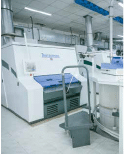
Energy Efficient Machineries
MSML always procures machines which provide high efficiency, production capacity, and machine longevity. These machines also have the advantages of less power consumption and noise level than other alternatives. For example, one of the production machines from Toyota uses Programmable Logic Control (PLC) which automatically adjusts with the revolutions per minute (RPM) thereby automatically contributing to optimum energy use and energy savings.
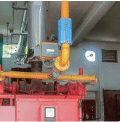
Eneflow Magnetic Devices
From the Enecon Corporation, USA, the Eneflow devices are used in generators which helped reduce carbon footprints. They also provided significant cost savings: more than BDT 8 million per year, by investing only BDT 60,000. These devices allow efficient utilization of fuel: saving 514 liters every day and hence savings for the future is ensured given the limited natural resources available.
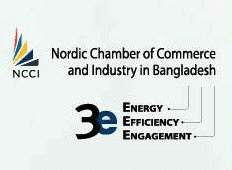
Energy Efficiency Engagement (3E)
The 3e project was undertaken by the Nordic Chamber of Commerce and Industry (NCCI) in Bangladesh. A detailed energy assessment has been done and improvement areas have been identified. MSML will be implementing these improvements to further enhance the efficiency of it's operations.

